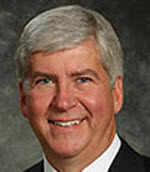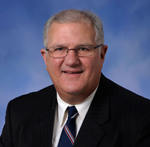Michigan tax facts, part 10: Sifting through fuzzy tax math on the campaign trail
Editor’s Note: The 10 Things Every Voter Should Know About Michigan Taxes
To help voters make sense of ubiquitous political arguments in this fall’s elections in Michigan, Bridge’s 10-part special report tells it like it is on Michigan taxing and spending issues. Today we conclude with parts nine and 10. Read each five-minute primer published so far:
Part 1: Are Michigan taxes too high, too low or just right?
Part 2: Who wants what in the long war over Michigan taxes?
Part 3: Who pays the taxes in Michigan?
Part 4: What do you taxes pay for in Michigan?
Part 5: Who gets tax breaks in Michigan?
Part 6: How much do taxes matter for business location?
Part 7: Will your city hall and local schools go bankrupt?
Part 8: What would Richard Headlee think today?
Part 9: What will happen to your taxes in the future?
Just about any politician with a memory can recite the line: “Read my lips, no new taxes.” George H.W. Bush famously uttered those words at the 1988 GOP presidential convention, won the election, then went on to raise taxes as president in 1990 as part of a budget deal.
In 1992, voters booted him from office and elected Democrat Bill Clinton.
It is no surprise, then, to find candidates in Michigan reluctant to speak with full candor about taxes, spending and budgets. This Truth Squad analysis looks at the tax rhetoric in three high-profile state political races this fall. Our conclusion: Today’s candidates are very careful not to repeat Bush’s 26-year-old campaign tax gaffe.
Tax talk in governor’s race
Former U.S. Rep. Mark Schauer, the Democratic candidate for governor, promises to “cut middle class taxes, reverse Governor Snyder’s education cuts, and get rid of tax breaks for companies that send our jobs overseas.”
On his website, Schauer vows to reverse income tax hikes signed into law by Snyder, including those for the child tax credit, low-income tax credit, homestead property tax credit and on pensions. Schauer also promises to boost spending for K-12 schools and universities, give tax credits to small business, reverse cuts in revenue sharing to local governments, do a better job protecting the environment and fix Michigan's crumbling roads.
How would Schauer pay for so many chickens in so many pots? He’s short on specifics.
According to analysis by former House Fiscal Agency Director Mitch Bean, the cost of Schauer’s proposals could easily reach $3.4 billion a year. That includes about $1.1 billion for eliminating tax increases on seniors, families and working poor. Bean pegs the cost of restoring funding to K-12 schools, higher education and revenue sharing at $1.1 billion. State transportation officials say Michigan needs at least $1.2 billion in added funds a year to fix its roads.
To fund roads, Schauer proposes a “bipartisan solution” that requires businesses – which received a $1.6 billion tax cut under Snyder – to “pay their fair share.” That sounds like a tax increase. Schauer does not specify what kind or by how much. He opposes raising the fuel tax to pay for roads.
Bean's analysis said Schauer could pay for some of his proposals by assumed revenue growth. Schauer also said that he would “close loopholes and end tax breaks” that don't create jobs. That would net just under $1 billion if all business credits and exemptions were eliminated. Schauer provides no further detail.
Snyder did just what he promised in the 2010 campaign, scrapping the unpopular Michigan Business Tax and replacing it with a 6 percent corporate tax. But, in so doing, he also pushed through tax hikes he didn’t emphasize in his campaign four years ago – hiking taxes on pensions, homeowners, low-income workers and wage earners.
Analysis by the Senate Fiscal Agency calculated that the business tax shift amounted to a $1.6 billion tax cut for business for fiscal 2012-2013. The House Fiscal Agency calculated that taxes on individuals would climb by $1.4 billion, including a $343 million hike in taxes on pensions, a $261 million tax hike on low-income individuals, $270 million in taxes on homeowners and a $223 million increase in income tax by freezing a scheduled drop in the tax.
Snyder also pushed for repeal of the Personal Property Tax on business equipment, a measure approved by voters on Aug. 4. The Lansing-based Citizens Research Council calculated that it would cost the state $500 million in revenue by 2025, since the state is committed to repay local governments for revenue losses it sustains as a result. That loss is to be made up in part by an increase in the state user tax, but mostly from anticipated gains from expiring business tax credits. But analysis by the Senate Fiscal Agency said it's not clear revenue gains will be sufficient to cover net losses, stating it is “unknown if the actual revenue generated from the expiration of certificated credits would be sufficient to fund reimbursements...”
Snyder has repeatedly said that Michigan needs to spend at least $1.2 billion more a year to fix Michigan's roads, floating the idea of hiking taxes on gasoline and diesel fuel while raising registration fees for passenger vehicles and heavy trucks. A strong majority of Michigan residents told the Center for Michigan that fixing the state's roads is an urgent priority for 2014. The GOP-controlled Legislature has thus far resisted any tax increase to pay for a road fix.
Maybe he’s had enough of tax changes. After pushing for taxes to pay for roads, his overhaul of the business tax and personal income tax hikes, Snyder has been largely silent on any other tax reforms he might pursue in a second term.
Tax tensions in state Senate race
Many seats in the Michigan legislature are “safe,” meaning they were essentially decided in the August primary election. The 7th District, in western Wayne County, is an exception. Incumbent Republican Patrick Colbeck, a Tea Party favorite, faces veteran Democratic representative Dian Slavens in a November face-off.
Colbeck says he can fix Michigan roads without a tax increase. In 2013, Colbeck noted that Michigan's growing economy spurred a general revenue increase of about $500 million. He said the state could simply freeze spending and use those funds for roads. He suggested that Michigan could build stronger concrete roads that would last longer, resulting “in potential savings of over $1 billion per year.” He said using “design, build and maintenance” contracts with road builders could save about $450 million a year.
Yet, investing in thicker concrete roads may cost much more, at least initially. Savings from those roads are unproven. Colbeck did not spell out where extra funds for more substantial roads would come from.
Colbeck also proposed raising revenues by selling advertising and naming rights for state assets such as bridges, rest areas and vehicles. He calculated that could raise as much as $462 million on a year, a projection that is speculative. Virginia passed a measure in 2012 authorizing the sale of naming rights to bridges and rest areas, subsequently granting GEICO Insurance naming rights to all of the state's 43 rest areas. That raised $2 million a year. Colbeck's projected savings from performance contracts is unproven as well.
Slavens backs a Democratic plan called Michigan 2020 to offer free college tuition to all Michigan high school graduates “without raising your taxes one cent.” The plan would cost an estimated $1.8 billion a year, a cost its backers propose be funded by reducing “business tax credits and loopholes” judged ineffective at jobs creation.
That figure refers to $32 billion in annual tax credits and exemptions of all types, as reported by the Michigan Department of Treasury. More than $30 billion comes from exemptions to the sales tax, such as for food and medicine, for property tax and income tax exemptions. Business credits and exemptions are listed at about $1 billion for 2014. Michigan 2020 proposes to target 6 percent of those exemptions to fund the free tuition plan. It does not identify one specific credit or exemption to be eliminated.
Said Slavens’s campaign spokesperson Stephanie Glidden: “There isn't a specific $1.8 billion identified because we didn't want to pick winners and losers, we wanted each and every tax credit/exemption to be graded fairly.”
If the free tuition plan ever becomes reality, winners and losers would have to be chosen at some point. But, as Bush the elder taught all politicians, the time to do it is not campaign season.
Said fiscal analyst Bean: “If you spend $1.8 billion more each year it has to come from someone paying more in taxes - it's not free money. They should be specific about what they want to eliminate.”
Fuzzy math in Monroe Senate race
Monroe County is home to another competitive state Senate race, the 17th District. Voters won’t find clear tax math there, either.
Republican Dale Zorn’s campaign materials http://www.dalewzorn.com/platform.html argue in platitudes for good roads, declaring that a “good infrastructure that allows business and industry to get goods to market is critical for a healthy economy.”
Zorn said he would use “more money from the general fund rather than creating new taxes or fees on residents or businesses” to pay for better roads. Zorn also said he would dedicate one cent from the 6-cent sales tax to fund roads. That would raise about $1.2 billion a year – the amount many say is needed to fix Michigan's roads. Nearly 75 percent of the state's sales tax revenue goes to K-12 schools, with about 16 percent financing most departments of state government and 10 percent sent to local governments through revenue sharing. Zorn does not say which he would cut to fund his sales tax revenue shift to roads.
Zorn’s opponent, Democrat Doug Spade, offers no concrete position on how to fix Michigan's roads or any other policy issue. His website says that Spade, a former state representative, has a record of “fighting for middle-class families, investing in our kids and standing up for seniors.”
It also states that “no one will work harder for you.”
The Truth Squad sent repeated requests over several days to Spade to ask how he would fund repairs to Michigan's roads, what he would do with the $1.4 billion Snyder tax increases and whether he would repeal the $1.6 billion tax cut for business.
“I just don't have the time,” he told the Truth Squad.
See what new members are saying about why they donated to Bridge Michigan:
- “In order for this information to be accurate and unbiased it must be underwritten by its readers, not by special interests.” - Larry S.
- “Not many other media sources report on the topics Bridge does.” - Susan B.
- “Your journalism is outstanding and rare these days.” - Mark S.
If you want to ensure the future of nonpartisan, nonprofit Michigan journalism, please become a member today. You, too, will be asked why you donated and maybe we'll feature your quote next time!


 Mark Schauer
Mark Schauer Gov. Rick Snyder
Gov. Rick Snyder Sen Patrick Colbeck
Sen Patrick Colbeck Dian Slavens
Dian Slavens Dale Zorn
Dale Zorn Doug Spade
Doug Spade